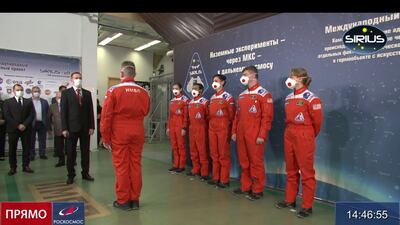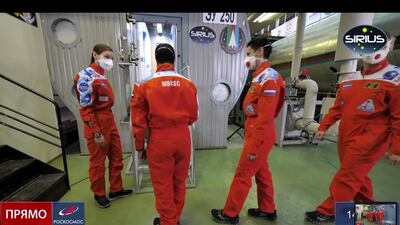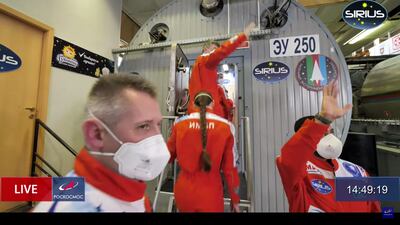An Emirati has begun an eight-month stay in a Russian facility, where he will live in near isolation to replicate the experience of a lengthy space mission.
Saleh Al Ameri is part of the Sirius 20/21 project that measures the psychological and physiological effect on human beings living in the extreme environments that astronauts face during space travel.
The international crew of six entered the NEK experimental complex in Moscow on Thursday, where scientists will observe their behaviour using cameras installed throughout the facility.
Emirati analogue astronaut
The 31-year-old is the first Arab to be part of an analog mission – field tests that simulate lengthy space journeys. These are crucial to understanding how space flight affects the body and mind, as governments and private companies work towards landing human beings on the Moon, again, and Mars.
Mr Al Ameri spoke to The National a few hours before he was locked inside the facility, and mentioned the emotional and mental challenges that he will have to endure.

“Whenever I'm stressed, I will try to find ways to become relaxed and more confident,” he said.
“I’m going to do many studies, talk to the crew, do many activities. This is the first Emirati and Arabic analog mission, but it will not be the last one.
“We are looking forward to becoming experts in human research programmes by involving and developing new future projects that benefit other sectors, like medicine and science universities.”
'Travelling to the Moon'
Crew members will simulate a space journey to the Moon as part of the experiment.
In the first few weeks, the analog astronauts will dock their "spacecraft" with an interplanetary station and transfer to a transport ship that will take them to the Moon.
They will dock with the "orbital station" and perform simulated spacewalks outside the floating structure.
This will be followed by several lunar landings and data analysis, before ‘ their "return to Earth".
The experiment is part of a five-year research programme by Russia’s Institute of Biomedical Problems and Nasa’s Human Research Programme.
It involves three Sirius missions, the first of which was completed in 2019 when six crew members lived in isolation for four months.
The final one is expected to be 12 months long and the most challenging.
“I'm a patient guy and that was one of the criteria to be chosen as an analog astronaut,” Mr Al Ameri said.
“You’re going to go through a lot of training, work, and you don’t know how your crew members will react during isolation and under stress, so you have to be patient.
“I will try to make our friendship stronger and maintain that for 240 days.”
Food and living conditions
There are dedicated rooms for each participant that help with privacy, while a small living room will allow them to socialise and watch television.
Each bedroom has a bed, desk and a cupboard.
The complex is made of tubular modules and the structure has its own atmosphere and air pressure to create a space-like environment.
They will not be able to make phone calls to anyone in the outside world. Limited emails and video calls to their families are allowed.
Meals will involve the same dehydrated food that astronauts eat on the International Space Station.
Mr Al Ameri said he has been provided with the same Emirati meals that Hazza Al Mansouri, the first Emirati man in space, took with him to the ISS.
These include madrooba (chicken and rice), saloona (chicken, fish, lamb or beef stew), and balaleet (vermicelli dessert).
“There are many varieties of dishes, including Russian, Japanese, American and the food Hazza took with him to the space station,” he said.
“We will also provide the crew members with Arabic dates and Arabic coffee. I hope that they will enjoy them and try to learn more about Arab culture.”
While the tasks will keep the crew busy, Mr Al Ameri plans to spend his free time reading and trying to improve his chess skills.
Why is the UAE participating?
The UAE plans to take part in several analog missions as part of long-term plans to send Emiratis to the lunar surface and to build a human settlement on Mars by 2117.
The Mohammed bin Rashid Space Centre is building a Dh500 million ($136 million) Mars simulation city in Dubai, with construction expected to begin next year.
The design includes analog facilities that can be used by Emiratis and other international participants in the future.
















